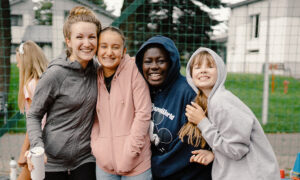November 23, 2021
Third Culture Kids in Europe
Do you know what a Third Culture Kid (TCK) is? Episode 10 of the “Josiah Venture Stories” podcast with Claire Patty is ready for you to listen to. She grew up in the Czech Republic with her family as a TCK. From a young age, she was impacted by being raised in a cross-cultural setting and seeing the gospel transform lives.
After graduating from Czech national school, she moved to Chicago to begin her studies in Children’s Ministry at Moody Bible Institute. During her years at Moody, God placed a passion in her heart for TCKs. Claire now serves on the Josiah Venture International team as the Josiah Venture Kids (JVK) Director.

In this episode, you will hear all about her experience as a JVK/TCK. She will also be sharing with us what it means to be a TCK, some of the common phrases that she hears JVK say, and some amazing resources.
You can listen to the full podcast episode below, or by clicking this link. Below we’ve also included written excerpts from the podcast, along with a list of some of Claire’s favorite TCK resources that she mentions in the podcast.
“So, Claire, how would you define a Third Culture Kid?”
A TCK is someone who has spent a significant part of their developmental years outside of their parents’ culture. The term “Third Culture Kid” was first coined in the 1950s by Ruth Useem, but Van Reken and Pollock really established the term in their book “Third Culture Kids: Growing Up Among Worlds.” In this book, they said that “the TCK builds relationships to all of the cultures without having full ownership of any.”
No matter how many cultures you grow up in, you’re still a third culture kid, not a “fourth”, “fifth” or “sixth” culture kid. TCKs take pieces from all of the cultures they grow up in. Because they are still in their developmental years, these cultures shape who they become—how they think, what they believe, and what they value. The challenge is that they don’t feel they truly belong in any of these cultures. The blessing is that they get to have cross-cultural experiences that form who they are.
Another helpful category to think about when understanding TCKs is to compare their experiences to those of “Cross Cultural Kids” (CCKs). A CCK is someone who grows up influenced by two or more cultural environments. For example, a CCK could be a child who grows up in a bilingual home and visits grandparents in another country every year, or someone who immigrates with their family due to economic or political reasons.

“Is there a difference between Third Culture Kids (TCKs) and Cross-Cultural Kids (CCKs)?”
One of the things that distinguishes TCKs from CCKs is something called an “expectation of repatriation.” This means that a TCK expects that one day, for one reason or another, they will probably move back to their passport culture. A CCK’s experience of “home,” belonging, language acquisition, and grief and loss may still be deeply impacted by their cross-cultural life; yet, they will experience these cultures differently than the TCK who often maintains one foot in one world and one in another. The TCK typically expects to move one day and return to their passport country. This move sometimes happens by choice, but often happens due to a change in their parents’ jobs. A TCK’s whole life can be upended by this job change.
Another difference between TCKs and CCKs is that TCKs have affiliation and/or loyalty to an organization or subculture, such as the military, government, missions organization, or business. These subcultures add to the identity formation of the TCK, both in positive and negative ways.
For me personally, I remember the day that I packed up all of my suitcases and was ready to leave for college. I remember praying and saying goodbye to the Czech lands. It felt like losing my home. I was being sent into a new season and I needed to be open handed about what would come after that, no matter what country it would bring me to. All I knew was the next step of moving to the United States.
“How important is identity to a TCK? Can you talk about that a little bit?”
Identity and belonging are two of the biggest struggles for TCKs. Knowing who they are as TCKs helps them realize that their experiences aren’t isolating, and they’re not alone. However, knowing their TCK identity is only one sliver of who they are. We talk with our JV Kids about belonging to God’s family and God’s greater story, and the eternal home we have with Christ. They find comfort in this from a young age. It’s a very tangible truth for them. It matters to them, because they are missing that feeling of acceptance and belonging in the world, so they find that uniquely in God’s Kingdom.
“Do you have a hard time saying goodbye as a TCK?”
Yep… it’s one of the vulnerable spots in my heart. I feel the pang every time someone leaves or I leave. There is sadness and grieving on both sides. Grief, loss, and goodbyes are all very intertwined with the TCK story.

“What was friendship like for you as a TCK?”
Friendships are very connected with loss and grief for TCKs. They say many hellos and goodbyes throughout their childhood. There were quite a few JV Kids who came and went, and that was hard. Friendships for Czechs tend to be more stable. Once you are friends with a Czech, you are typically friends for life. A lot of my classmates had two or three close friends, and that was it. I came into my school as a second grader, and most of my classmates had already known each other since kindergarten. Their friendships were already established, and there wasn’t space for me. I went through my whole elementary school and middle-school years changing friends every year, which was unusual because it wasn’t true for the others in my class. Someone would be friends with me for one year, but then not care about our friendship the next year, since they had other friends. That was tough.
Stable friendships are like anchors for TCKs. A lot of JV Kids say their friendships with other JV Kids feel different, because they don’t have to explain themselves and they can instantly connect.
When I went to college in the States, I was surprised to find that there were so many people I had commonalities with. Some of them weren’t TCKs, didn’t have cross-cultural experiences, or hadn’t been out of the country, but there were other connection points that were valuable. That is important for us TCKs to realize—that even with our unique backgrounds, there are connection points with people, especially in the body of Christ. Even practically, I had a friend in college who had moved often, so she understood what it was like to say goodbyes. I had another friend who grew up in a small town, so she spent her childhood exploring forests, just like me. My encouragement to adult TCKs would be to seek out connections with people who may look like they are different from you. You may be surprised that you have more in common than you think.

“What are some stereotypes that people have of TCKs?”
One of the stereotypes is that they are rootless and that they float between worlds and communities, not building close ties with anyone. There is also the stereotype of TCKs building relationships far too quickly, going deep way too fast. There is a group of TCKs who goes straight to the deep things when they first meet you. They may recognize that they don’t have a lot of time for building relationships, so they will try to build them as fast as possible in order to have at least some relationships. So, there are those two sides to things.
Stereotypes for MKs are a whole other category. They often get stereotyped as being socially awkward. From our experiences with JV Kids, we have actually seen that they are very socially competent, remarkably so.
“What are common phrases you hear JV Kids saying?”
Most of the JV Kids go to national schools, so one of the most common phrases we hear them say is this: “Yes, [national] school is so hard, but it’s so worth it.” Most of the JV Kids today would say that school is the hardest thing in life for them. The system does prepare us well academically in most areas, but the emotional challenges of national school can be intense. Personally, I don’t know how I would have even gotten through national school without a native speaker’s help. I had a tutor for Czech school from second grade until I graduated from high-school.
In the midst of this stress, the JV Kids often see their experiences in national school as “worth it.” They see school as an opportunity to build local friendships and develop a sense of deeper belonging in their country. They also see the spiritual aspect of this and value how they learned to depend on God through their challenging schooling experience. Still, it’s pretty challenging for them!

“What book recommendations would you give to parents or kids … or anyone interested in TCKs?”
If you are interested in resources about TCKs, thank you! They are a culture of their own. It means a lot to us when you take the time to try to understand how we process the world, because this can even be confusing to us! If you pull out one of these books or resources below, feel free to show them to TCKs, because it will mean a lot to them that you care.
Here are some of my favorite resources:
- “Third Culture Kids: Growing Up Among Worlds” by David Pollock and Ruth Van Reken
- Instagram accounts – search for Third Culture Kids, for example, @tckglobal
- “Raising Up a Generation of Healthy Third Culture Kids” by Lauren Wells
- “Swirly” by Sara Saunders (A Children’s Book)
- “I Am Third, Volume II: Josiah Venture Kids and Their Journeys” by JV Kids
- “JV Third Culture Kids Deep Dive” qualitative research project (2019)





